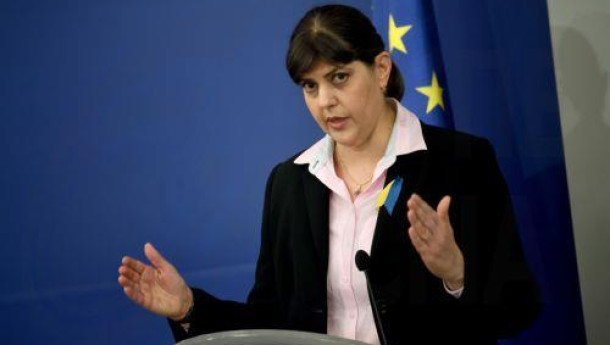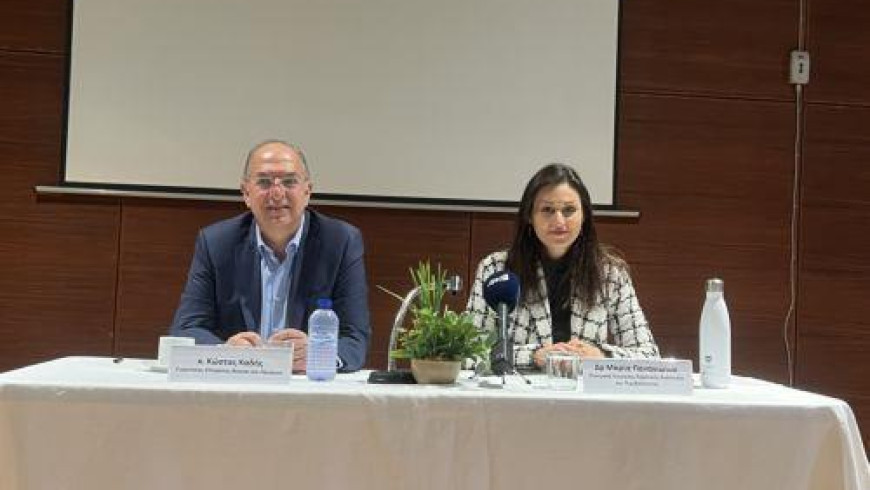
With 10 active investigations in Cyprus and a total of 58 cases where EPPO in Cyprus is assisting other participating member states, Cyprus proves to be a strong partner for all member states participating in the European Public Prosecutor’s Office, the Attorney-General of the Republic, George Savvides, said at a workshop on the role of the EPPO in the criminal protection of the financial interests of the European Union, held on Wednesday at the University of Cyprus, in the presence of the the European Public Prosecutor Laura Codruța Kövesi.
In his welcome address, the Attorney General said that the European Union, realising the need for an independent central body in order to confront the challenges posed by organised crime, fraud and corruption, created the EPPO to strengthen the fight against crimes affecting the financial interests of the Union and stressed that Cyprus was one of the first members to have expressed their wish to participate and cooperate for the establishment of EPPO, and remains the only common law country that participates in the EPPO.
With the expertise and dedication of the new European independent body, the hard-earned resources of Member States and citizens of the EU are now more effectively protected, continued the Attorney General, adding that his office has been designated by law as the competent authority for the implementation of Regulation 2017/1939 establishing the European Public Prosecutor's Office.
He also expressed his satisfaction for the excellent, as he described it, cooperation with the EPPO, which has been made easier through the European Prosecutor, Anni Pantazi, and the European Delegated Prosecutor, Andri Costantinou, who comes from the ranks of the Law Office of the Republic and is an active member of the prosecutorial authorities, acting on behalf of EPPO to investigate and prosecute criminal offences against the financial interests of the EU.
He added that the Attorney General’s office supports the EPPO by providing the necessary infrastructure and administrative support staff for the EPPO office in Nicosia, while all competent national authorities assist EPPO in investigations wherever required.
He said that 2024 being the third year that EPPO is fully operational, there are currently 10 active investigations in Cyprus and a total of 58 cases where EPPO in Cyprus is assisting other participating member states, noting a steady increase of the cases, and stressed that Cyprus proves to be a strong partner for all other participating member states.
Savvides further noted that the Law Office of the Republic, with the collaboration of the European Delegated Prosecutor and the Ministry of Justice, prepared and submitted draft bills to the House of Representatives for better implementation of the EPPO regulation and to improve harmonisation of the PIF directive, adding that recently the two draft bills were voted into law.
“Our shared vision is a more transparent, accountable and resilient European Union which we are hoping to achieve through our dedication and commitment to justice”, concluded the Attorney General.
European Public Prosecutor, Laura Codruța Kövesi, said that according to the Office’s latest annual report, 2 1/2 years after the start of its activities, EPPO has had more than 1,900 active investigations with an overall estimated damage of more than €19 billion, over 200 of which relate to the first project funded under Next Generation EU, with an estimated damage of over €1.8 billion.
“These numbers may seem shocking but this is just the beginning. More money will descend to the Member States with the Next Generation EU funds and a lot of the flow will happen from now on. For sure, our workload will continue to increase”, she added in that regard.
The European Public Prosecutor also highlighted the close links between organised crime and VAT fraud, which according to Kövesi, by the end of last year represented almost 60% of the estimated damage over all the investigations.
“More money in the hands of criminals equals more criminal economy, equals more crime, violence and human misery. This is the truth and we should not should sugarcoat it. Over the last decades, organised crime has grown out of any acceptable proportion. We have a collective responsibility on this. For years, we have ignored what the real level of financial fraud and corruption means for our own security. This is why, as prosecutors, we cannot tolerate white-collar crime”, she stressed on the matter.
Referring to her recent visit to Athens, where the main topic of interest was, as she said, the Tempi railway accident where 57 people were killed and 80 others were injured, Kövesi said that this tragedy proves that fraud and corruption eventually kills.
She added in that regard that in December last year, the EPPO brought charges against 23 suspects, including 18 public officials, for crimes relating to the execution of contracts for restoring remote traffic control and signalling system on the Greek rail network, contracts co-financed by EU cohesion funds.
She added that according to the investigation, a total of 7 unlawful extensions of the regional contract were granted and for this reason, the project has not been yet completed more than nine years after the contract was signed. She also stressed that despite the fact that the original scope of one of the contracts had been changed in an unlawful way, no one reported this to EPPO and that the Office has opened the case ex officio.
“We can no longer ignore the fundamental link between white-collar criminals and the internal security. If we look at the numbers according to available estimates, judicial authorities managed to seize less than 2% of yearly proceeds of organised crime in the EU. This means that we need to redefine our strategy and we have to work together. If we want to seriously affect criminal organisations’ ability to operate, we must take white-collar criminals out of the equation. We depend on a strong and efficient EPPO to do this and we are here to help”, she concluded.
Vice-Rector for Academic Affairs of the University of Cyprus Eleni-Tatiana Synodinou said in her remarks that corruption and economic crime undermine the rule of law by eroding trust in public institutions, distorting fair competition and diverging public fund away from essential services and infrastructure, adding that the establishment of the EPPO marked a monumental step forward in collective efforts to safeguard the financial interests of the EU and to ensure that justice is served across member states.
In terms of the challenges cross-border crimes pose to national legal systems, she added that EPPO stands as a testament to the commitment to cooperation transparency and efficiency in prosecuting crimes that transcend national borders, adding that strengthening anticorruption measures and promoting transparency are crucial steps towards fostering economic growth and maintaining the integrity of the EU’s governance structure.
President of the Cyprus Bar Association Michael Vorkas said in his intervention that the conference offers an opportunity to explore various dimensions of the EPPO’s work from legal frameworks and jurisdictional challenges and case studies, its mechanisms and the obstacles it faces and the successes it has already achieved.
He also highlighted the proactive role of the Cyprus Bar Association in these efforts and expressed the association’s commitment to justice and its protection, being actively engaged in fostering a legal environment that supports the EPPO’s mission and enhances its capabilities, advocacy and cooperation and ensuring that its legal practitioners are contributing effectively to this pan-European effort.
On behalf of the Minister of Justice and Public Order, the Deputy Chief of Cyprus Police Demetris Demetriou said in his speech that Cyprus was one of the EU member states that strongly supported the setting up of the EPPO and thus one of the founding members of the intergovernmental body which now brings together 22 member states within the so-called EPPO zone.
He added and the Financial Crime Unit of Cyprus Police is in very close cooperation with the European Delegated Prosecutor Andri Constantinou, having been reinforced in 2023 with 6 additional investigators and in 2024 with another 3 investigators, consisting today of 31 members, 26 specialised investigators and 5 accountants.
He also said that 9 cases concerning the misappropriation of EU funds are currently under investigation by the Financial Crime Unit, 5 of which concerning a research project, 1 case VAT fraud, 1 case of breach of conduct at the European Parliament and 2 cases of fraud regarding public procurement.














 3287.99
3287.99 1275.09
1275.09
